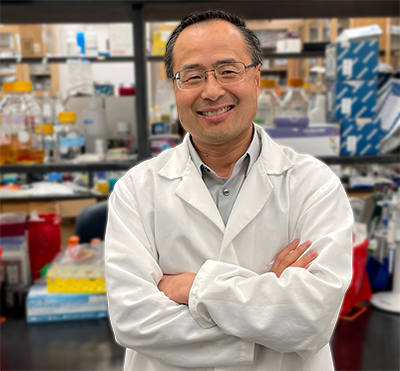
Research drives Dr. Qijing Zhang each and every day.
“If I get an experiment started, I’m anxious to learn the results,” said Zhang, a Clarence Covault Distinguished Professor in Veterinary Medicine.
He’s so passionate that his nickname was “Scientific Nerd.” As a graduate student in the College of Veterinary Medicine (he earned his PhD in 1994), his brain was constantly racing, thinking about his latest research study.
“My mind was so busy, I failed to stop at a stop sign and got into an accident,” Zhang recalled. “That really scared me, and I had to consciously put my mind at rest and not think about science all the time.”
Over the years, Zhang has added other lines to his resume including serving as the College of Veterinary Medicine’s associate dean of research.
But his own research studies are a constant pull on Zhang. And make no mistake about it – he’s good at what he does. Really good.
This past spring, Zhang was elected to the National Academy of Sciences in recognition of his distinguished and continuing achievements in original research.
Election to the National Academy of Sciences is among the most prestigious honors given to U.S. scientists and engineers. Zhang is just the 12th Iowa State faculty member to receive the honor, and the first faculty member in the College of Veterinary Medicine to be elected since Dr. Harley Moon’s election in 1991.
“Dr. Zhang’s election to the National Academy of Sciences is a testament to his international impact, leadership and outstanding achievements in antimicrobial resistance and food safety,” said Iowa State President Wendy Wintersteen. “We are delighted that Dr. Zhang is being recognized with this prestigious honor.”
“I am extremely honored to be elected to the National Academy of Sciences,” Zhang said. “It is an honor not just for me, but also for my team and my beloved college and university.”
Zhang’s research has had regional, national, and global impact on the control of antibiotic-resistance pathogens in animals and humans. As a renowned microbiologist, Zhang built a world-class research program on antimicrobial resistance and food safety.
Early in his academic career, Zhang concentrated his research on swine pathogens. He made the switch to antibiotic resistance and food safety and has never looked back.
“There was a natural need for this type of research and at the time, few people were trained to do it,” he said. “It was a challenge, but a great opportunity.
“We had to identify gaps in the field and what needed to be done to close those gaps. There was an advantage to be one of the first in this area.”
That advantage has led to competitive grants totaling over $25 million from not only the USDA and NIH, but the National Science Foundation and the Food and Drug Administration.
His expertise in antibiotic resistance has earned him international acclaim. He is an expert in areas related to antibiotic resistance development, persistence, transmission from animal reservoirs to humans, and mitigation strategies. He is a pioneer in the effort to understand mechanisms involved in the emergence, persistence, and fitness of antibiotic-resistant Campylobacter, a major zoonotic pathogen worldwide.
Zhang’s research group at Iowa State was among the first to document the impact of antibiotic resistance on bacterial fitness. His work is often used as a resource for science-based policy making by regulatory agencies on the use of antimicrobials in animal production. His research also identified emergence and transmission of zoonotic pathogens and their intervention strategies, contributing to improvement of animal health, and public health.
His journey to the National Academy of Sciences started out simple enough. Zhang grew up in a small village in China. He fondly remembers his childhood spent working on his family’s fields, working with plants.
“I was really fortunate to get into college,” he said. “My two older brothers were smarter than I was, but they had no opportunity to attend college. I guess I was born at the right time.”
And for Iowa State, he was in the right place at the right time. Zhang served as an interpreter when Dr. Richard Ross, then dean of the College of Veterinary Medicine, visited Zhang’s university in China.
The rest as they say is history.
“I knew Dr. Ross from his publications because we were researching the same subject,” Zhang said. “That connection led to me becoming a graduate student in his lab.
“I am very proud to not only be a faculty member at Iowa State but a graduate as well. I feel incredibly fortunate for having had my career at this fine institution.”
September 2022
